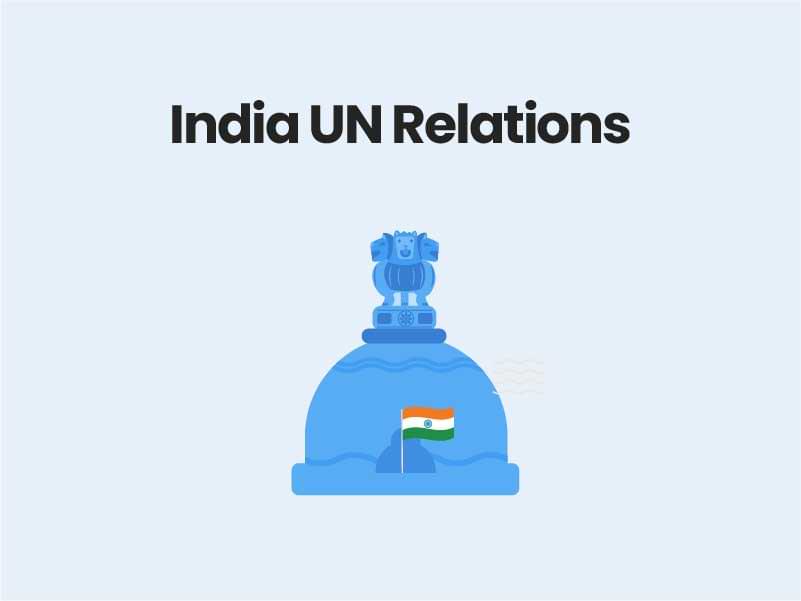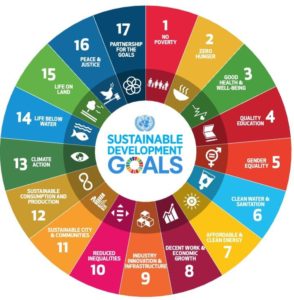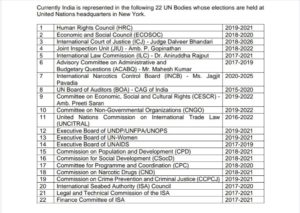Companion@360 → 7 Month programme to sharpen your writing skills → REGISTER NOW

India-UN
India was among the select members of the United Nations that signed the Declaration by United Nations at Washington on 1 January 1942. As a founding member of the United Nations, India strongly supports the purposes and principles of the UN and has made significant contributions to implementing the goals of the Charter, and the evolution of the UN’s specialized programmes and agencies. India is steadfast in its efforts to work with the committee of Nations in the spirit of multilateralism to achieve comprehensive and equitable solutions to all problems facing us including development and poverty eradication, climate change, terrorism, piracy, disarmament, peace building and peacekeeping, human rights.
Sustainable development goals:
UN Priority Areas in India
- Poverty And Urbanisation:
- Nutrition And Food Security:
- Education And Employability
- Health, Water And Sanitation
- Skilling, Entrepreneurship And Job Creation
- Climate Change, Clean Energy And Disaster Resilience
- Gender Equality And Youth Development
- North-East
UN Organisations in India
- Asian and Pacific Centre for Transfer of Technology (APCTT): APCTT is a regional institution of the United Nations Economic and Social Commission for Asia and the Pacific (UNESCAP) servicing the Asia-Pacific region. The Centre focuses on activities related to technology information, technology transfer and innovation management which are SME-oriented, driven by IT and also environmentally responsible and gender conscious.
- Food and Agriculture Organization (FAO): Achieving food security for all is at the heart of FAO’s efforts. FAO’s mandate is to raise levels of nutrition, improve agricultural productivity, better the lives of rural populations and contribute to the growth of the world economy.
- International Fund for Agricultural Development (IFAD): IFAD is dedicated to eradicating rural poverty in developing countries. Its focus is on country-specific solutions, which can involve increasing the access of rural poor people to financial services, markets, technology, land and other natural resources.
- International Labour Organization (ILO): The ILO was founded in 1919 to bring governments, employers and workers together for the cause of social justice and better living conditions everywhere. ILO’s mandate of social justice, as the basis for peace, is expressed today as Decent Work for all.
- World Health Organization (WHO): The World Health Organization is responsible for providing leadership on global health matters, shaping the health research agenda, setting norms and standards, articulating evidence-based policy options, providing technical support to countries and monitoring and assessing health trends.
- World Food Programme (WFP): WFP is the food aid arm of the United Nations system. Food aid is one of the many instruments that can help to promote food security, which is defined as the access of all people at all times to the food needed for an active and healthy life.
- UN Women: UN Women in India works closely with the Government and civil society to set national standards for achieving gender equality. It works to strengthen the economic empowerment of women, end violence in all its forms, promote greater participation of women in politics and decision-making and ensure that policies and budgets reflect the needs of women.
- United Nations Office on Drugs and Crime (UNODC): The mandate of UNODC is enshrined in UN Conventions and Protocols, the universal instruments against terrorism and UN standards and norms in crime prevention and criminal justice. With the help of these instruments, UNODC helps Member States address illicit drugs, crime and terrorism.
- United Nations Children’s Fund (UNICEF): UNICEF advocates for the protection of children’s rights, to help meet their basic needs and to expand their opportunities to reach their full potential. UNICEF is committed to ensuring special protection for the most disadvantaged children, whether victims of war, disasters, extreme poverty, violence and exploitation and those with disabilities.
India’s Contribution to UN
- Indian Contribution to United Nations Peacekeeping: India has a long and distinguished history of service in UN peacekeeping, having contributed more personnel than any other country. To date, more than 244,500 Indians have served in 49 of the 71 UN peacekeeping missions established around the world since 1948. Currently, there are 6,178 troops & police from India who have been deployed to UN peacekeeping missions, the fourth highest amongst troop-contributing countries.
- India became the first country to deploy an all-women contingent to a UN peacekeeping mission.
- Familiarization visits to India
- Indians at United Nations:(1) Mrs. Lakshmi Menon, India’s delegate to the Third Committee in 1948, argued forcefully in favour of non-discrimination based on sex and “the equal rights of men and women” in the in the Universal Declaration of Human Rights.
(2) Mr. Arcot Ramasamy Mudaliar was India’s delegate to the San Francisco Conference leading to the creation of the United Nations. He also had distinction of serving as the first President of the United Nations Economic and Social Council (ECOSOC) in 1946.
Representation in UN Bodies
India has continued its successful run at the elections to various UN bodies.
United Nations Security Council (UNSC)
- It is the UN’s main executive body with the primary responsibility of maintaining international peace and security.
- However, the veto powers possessed by the UNSC’s five permanent members are used as an instrument to shore up their geopolitical interests, regardless of the disastrous consequences for the victims of armed conflict. As it can be seen in Syria, Iraq, etc.
- Further, It does not reflect today’s distribution of military and economic power, nor a geographical balance. Thus, the structure of the 15-member Security Council ought to be more democratic and representative.
- This has been long overdue on the demand, especially from the so-called Group of 4 (G4) countries — Brazil, Germany, India and Japan — which advocate a permanent seat for all of them.
India and UNSC
India recently got elected as a non-permanent of the UNSC.
- India has the world’s second-largest population.
- World largest liberal democracy
- World twelfth largest economy
- One of the main contributors to the UN regular budget.
- 3rd largest armed force
Significant Achievements
- Major Initiatives:
- The first evert single-country South-South cooperation initiative at the UN was launched in June 2017 through the “India-UN Development Partnership Fund”, a $100 million fund facility to undertake projects across the developing world. In April 2018, a US$50 Million Commonwealth window was created under the Fund to support SDG related projects in developing countries of the Commonwealth.
- The UNGA Resolution declaring 21 June every year as the International Day of Yoga was adopted in Dec 2014 with a record number of 177 co-sponsors. This set-in motion global annual observance of the International Day of Yoga.
- Elections:
- The election of Judge Dalveer Bhandari to the International Court of Justice (ICJ) in Nov 2017 was a landmark event for India in terms of its unprecedented success in unseating a sitting judge from UK, a P5 member.
- India was elected to the Human Rights Council in Oct 2018 for the period 2019- 2022 with highest number of votes (188/193).
- Other achievements:
- International Solar Alliance (ISA)was registered with the UN as a treaty-based inter-governmental organization with effect from 9th Feb 2018
- India was among the 40 plus countries in 2017 that presented their Voluntary National Review at the UN on the progress made in achievement of SDGs.
- In Sept 2018, UNEP recognized Prime Minister Modi in the “Policy Leadership” category for pioneering work in championing the International Solar Alliance and for the pledge to eliminate single-use plastic in India by 2022.UNEP also selected Cochin International Airport, which is fully-powered by solar energy, for the Champion for entrepreneurial vision award.
Read International Relations Notes



